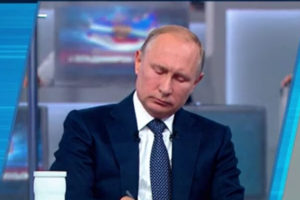No Fireworks As Putin, Officials Read From Same (Dull) Script During Call-In Show

(Article ©2018 RFE/RL, Inc., Radio Free Europe/Radio Liberty – rferl.org – Robert Coalson – June 7, 2018 – also appeared at rferl.org/a/no-fireworks-as-putin-officials-read-from-same-(dull)-script-during-call-in-show/29278720.html)
The big innovation in this year’s rendition of Russian President Vladimir Putin’s Direct Line question-and-answer program turned out to be a dud.
In the run-up to the June 7 show, Kremlin spokesman Dmitry Peskov announced that, in contrast to previous years, Putin would have his entire federal government and regional governors waiting in their offices to respond to complaints from constituents.
It was supposed to be an effort to add some fireworks to a broadcast that has dragged on for hours in past years.
That didn’t happen.
When the lights went up on this year’s program, the entire live audience of previous years had been replaced with a stage showing Putin sitting at a table with two moderators, surrounded by large-format screens.
On one of them, a checkerboard of officials sat in poorly lit offices that lacked virtually all decoration, except for the Russian flag. Most desks were small and covered with papers. Walls were bare or featured only the logo of the region or ministry.
Before Putin took the stage, a moderator on Russian state television, which hosted the live national broadcast, explained the innovation and assured audiences that the questioning of the officials would be “interesting.”
Some viewers may have been hoping for a repeat of a nationally televised incident in 2009 when then-Prime Minister Putin traveled to a factory in a St. Petersburg suburb to sort out a wage-arrears dispute:
With the cameras rolling, Putin spoke to local officials as if they were misbehaving children.
“Why did you only start running around like cockroaches right before I arrived? Why was there no one here before who was capable of making decisions?” he said.
The highlight came when Putin took factory owner and oligarch Oleg Deripaska to task, forcing him to sign an agreement to pay workers, then commenting when Deripaska nearly walked off with the pen that Putin had thrown at him for his signature.
Тhere was nothing like that during this year’s four-hour Direct Line broadcast.
All of the officials Putin called on were clearly in on the script, reading from notes they had prepared in advance. The officials typically spoke in the low, droning monotone that is familiar to those who have heard Russian judges reading their trial verdicts.
In a post on Twitter, British journalist Oliver Carroll noticed the disconnect with the first official, Energy Minister Aleksandr Novak.
“It’s often stated that Vladimir Putin’s direct lines are well-rehearsed, theatrical affairs,” Carroll wrote. “Well, given the level of drama so far – we’ve had ten minutes on petrol policy – I’d like to speak to the scriptwriters….
Moderators repeatedly cut off rambling officials who stared down at their desks and seemed determined to read through their entire stacks of papers.
Moderators also reminded officials that this was “live television.” In several cases, moderators spoke over officials who couldn’t get the hint that their time was finished. Health Minister Veronika Skortsova, for example, read from her notes until she was told to wrap it up:
For his part, while officials droned on, Putin was often shown jotting down in a notebook SMS messages from the large screens for responses later in the show.
Still, Putin’s own exchanges with officials were sympathetic.
He limited himself to requests that the officials look into various matters and he accepted their explanations. He did not ask them tough questions and he did not allow their aggrieved constituents to respond.
And, not surprisingly, the officials all devoted generous portions of their airtime to thanking Putin for his support.
